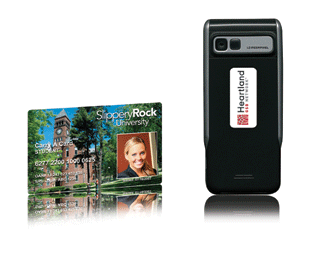East Stroudsburg successfully employs a phased approach to campus card growth
Relatively young, as card programs go, East Stroudsburg University’s eCard began just four years ago. The small four-year Pennsylvania school located in the Pocono Mountains was using a photo ID card that included the Social Security Number, a rising cause for concern in today’s ID-theft-prone world.
In March 2000, the 6,200-student university recarded the campus, said the university’s director of the Campus Card Center, Bob Smith. What ESU installed was General Meters’ University One Card System, “General Meters had the most expansive and all-inclusive system of the ones we looked at,” he said.
General Meters, headquartered in Colorado Springs, Colorado has been in business since 1979 and developed its One Card System in 1981. The first school to make use of it was Utah’s Brigham Young University’s law library, said Mr. Zander. The company currently services 350 universities in the U.S., Canada and Europe, he added, including Canada’s largest college, the University of Waterloo at Ontario.
“We have clients with as few as 1,000 students all the way up to 250,000 students for universities with multiple campuses,” he said. “We do campuses with 90,000 students, some in Canada, some here. They didn’t start that way, but as their campuses grew they only paid for the modules they were using.” He said a single module can cost anywhere from $ 6,000 to $50,000 depending on the number of students.
This ability to grow, without having to pay for something you’re not using, meant an ideal situation for a small college like ESU. In addition, only about a third of ESU’s students live on campus. The rest commute.
ESU’s eCard, with a picture of the student overlaid against an aerial view of the university, is used for residence hall access to perimeter doors. The card is also used for meals, vending, campus bookstore, and laundry payments.
The card is also used in the library to check out books, use copiers or laser printers, and pay fines. Since the students have to have their eCard to pay for printer or copier use it cut down on paper waste. “Some students were printing 100 pages and throwing away 98,” said Mr. Smith.
Students are, or soon will be, billed for their telephone and cable television bills through their eCard, he said.
Each student who buys a meal plan also receives about $100 of what Mr. Smith calls “play money” that students can use to buy food at any of the campus’s four eating establishments.
“We’re doing the university in steps,” he said. “We started in 2000 with two (of nine) residence halls with laundry and vending, then a month or two later, we added another building. Two years ago we added the parking gate,” he said. “A lot of the students were parking in the faculty or staff lots, so we felt the need for the gate.” Parking at ESU is first-come parking for juniors and seniors who are issued hang-tag parking permits. “We don’t allow freshmen or sophomores to bring their cars to campus unless they have a medical condition, are over 21, or have earned 30 credit hours.”
When the University One system was first installed, “we had a few bumps and grinds at the beginning because every building is different. The first year was rough, we had a lot of problems with certain building accesses and vending, but General Meters was excellent in tech support. I can’t say enough about them. If we can’t figure out the problem over the phone, they’ll send someone out.”
If the card is lost or stolen, it can be easily locked out, as long as the university knows about it. Otherwise, like with credit cards, the student is only liable for $50, said Mr. Smith.
Students with lost cards are issued a temporary one which costs $15 and allows them access to their dorms and meals. The $15 is returned to the student if the card is found, or it’s good for a new card if the lost one never turns up, said Mr. Smith.
While the General Meters’ system has the capability of allowing the card to be used off campus, Mr. Smith said ESU has no plans to do so. Right now, he added, there is only one location (away from the main office) for the card to be reloaded-an automatic deposit machine in the library. “We’re thinking about adding another in the University Center,” added Mr. Smith.
“At the deposit machine, cash or credit cards can be used. At our office we also accept checks. While we do not have an Internet option for card reloading, parents can call and add money via a credit card,” he said. “We felt there was a security issue with going online,” he said.
Mr. Zander said General Meters does have a “web module” available “that will clear credit cards for remote deposits into the One Card system.”
“We went to the card in the first place for the convenience of the students,” said Mr. Smith. “That means fewer keys. All of our employees also have eCards.”
A new addition to the campus is the $10 million recreation center that opened last August. The card is swiped at a turnstile, granting the student access.In the works is a 100,000 square-foot science and technology building which will add new challenges for the eCard. “Currently, we have 130 points of access on our entire campus,” said Mr. Smith. “This one building will have 100 points of access, all available by the eCard.”
But Mr. Smith is already planning for an expansion of his department. He’s looking for more computers and more staff. Currently he has himself, one full-time assistant and five work study students who each put in 10 hours a week.
During the summer ESU hosts several conferences/camps, such as soccer, bagpipes, band camp, and wrestling, all involving various age groups. “We can have 2,000 or 3,000 people on campus at one time,” said Mr. Smith. “All the conference attendees get a non-photo ID card that includes a meal plan so our foodservice provider, Aramark, can track how many meals each camp uses.”
Next up? ESU intends to upgrade their point-of-sale terminals with the new stealth touch screens from General Meters. “Right now we have a 140-key keyboard,” says Mr. Smith. “We’ll add five POS terminals and get rid of the keyboards in the food establishments.” And it seems that ESU’s commitment to General Meters is quite strong. According to Mr. Smith, the university is in the process of signing another five-year contract with General Meters.



